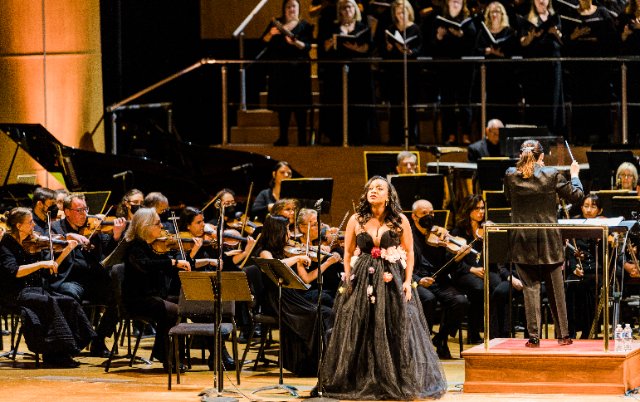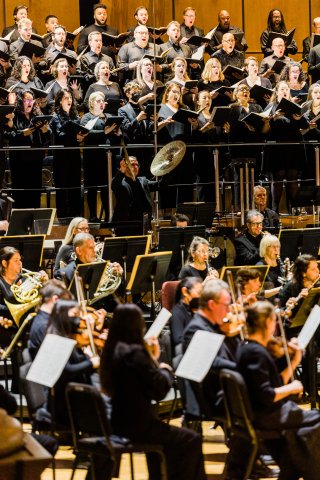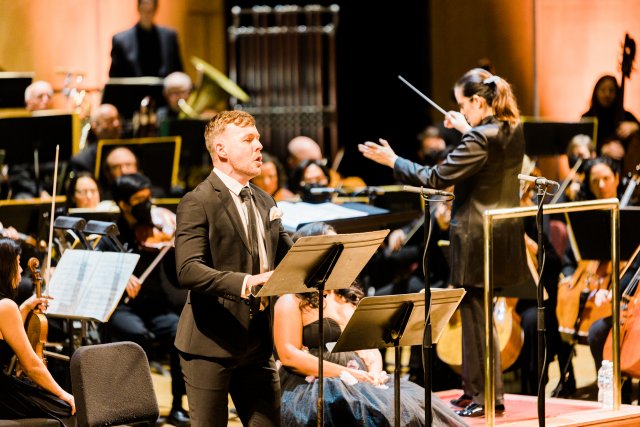Opera Philadelphia Mounts Credos
Margaret Bonds and Carl Orff in One Performane
By: Susan Hall - Feb 06, 2023
In one smashing performance, Opera Philadelphia presented two Credos, statements of belief by composers who lived and worked at about the same time, in strikingly different circumstances. Carl Orff survived the Nazi regime in Germany by not protesting. Orff did not write for Hitler, but Hitler liked his music. Orff’s Carmina Burana which expressed central beliefs in love, lust and dance, has been wildly popular since its first outing in Frankfurt in 1937. It is the most frequently performed choral work of the 21st century.
Credo was one of composer Margaret Bonds’ last works. Bonds grew up in a thriving Chicago artistic community. She studied with Florence Price who lived in Bonds’ home when she first arrived in Chicago. During that time, Price was working on her Symphony in E Minor, intending to submit it to the Rodman Wanamaker Competition. Margaret Bonds writes that they used to sit around the kitchen table copying out parts, and "when we were pushed for time, every brown-skinned musician in Chicago who could write a note.’ Bonds would come to set over two hundred poems of her friend Langston Hughes.
Philadelphia is out in front of other musical institutions as they embrace the unheralded nooks and crannies of musical performance. The score for Bonds’ Credo, completed in 1972, was not published until 2020. It is a musical setting of W.E.B. Dubois’ Credo, a hymn to Black people based on the form of the Nicene Creed of the Christian Church. It offers a powerful and reverent tribute to a higher power and to Black Peoples.
Bonds’ music is tonal. Harmonies reflect popular and jazz tunes. It is an accessible and moving work, as it is conducted by Lina Gonzalez-Granados with the Opera Philadelphia Orchestra and Chorus.
We do not think of Dubois as a lyrical writer, but certainly his “Credo,’ the introduction to Darkwaters published in1920, is musical.
An activist in the civil rights movement, Bonds dedicated this piece and her Christmas Cantata The Ballad of the Brown King to Martin Luther King, Jr. Bond's work includes modern arrangements of African-American spirituals, many of which were performed by her friend, soprano Leontyne Price. Most popular were Bonds’s 1962 settings of “He's Got the Whole World in His Hand” and “Swing Low, Sweet Chariot”.
Bonds moved to Los Angeles in 1967 to pursue film scoring. She lived and worked there until her death in April 1972. The Los Angeles Philharmonic paid tribute to Bonds with a performance of Credo.
An affirmation of racial justice, peace, and Black pride, the piece matches Du Bois’ reverent words with Bonds’ powerful orchestration and melodic language. Percussion and horns are used to triumphant effect by both Bonds and Orff.
From the first familiar and arresting chords of vocal and percussive ferocity, Carmina Burana captures our attention. Bracketed by the thundering cries on the fickleness of fortune and full of lilting celebrations of spring and raucous drinking songs, it is a familiar work, always welcome.
Orff in his favor was a connoisseur of Greek drama, and a perceptive scholar who edited and performed Monteverdi long before the rest of the world rediscovered the Baroque composer. He responded to what he saw as a need for people to express themselves through art if they were to become “complete” human beings. He developed a musical learning system for children which is still used. Yet one of his four wives says that he himself was full of “demonic forces' ' and would “wake up screaming at night”. He used people shamelessly. Yet, as another wife puts it, “all his life he wanted forgiveness” for the guilt that consumed him. He was obsessed by the myth of Orpheus, the musician who descended into the Underworld. “Just like Orff himself,” his biographer notes.
The singers for both credos were outstanding. Soprano Brandi Sutton is clearly on the cusp of a big career. Her voice is rich in vibrato. Yet it seems perfectly natural as she soars the octaves. Baritone Ethan Vincent was particularly effective as he rasped in helden tones when his character expressed lust and fury. Both singers are Opera Philadelphia debutants. Alasdair Kent sang in the company’s superb production of Written On Skin in 2018. We have noted his smooth, tender tenor in Munich as well.
The chorus and orchestra filled the Academy with dramatic and meaningful tones. Opera Philadelphia has again offered significant and pleasurable listening.






